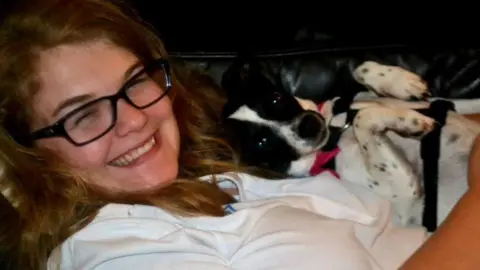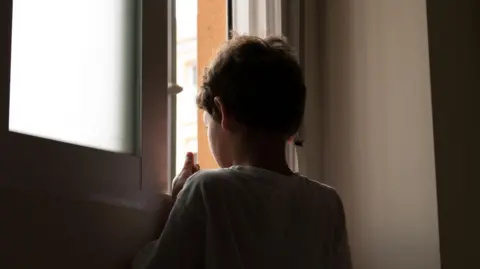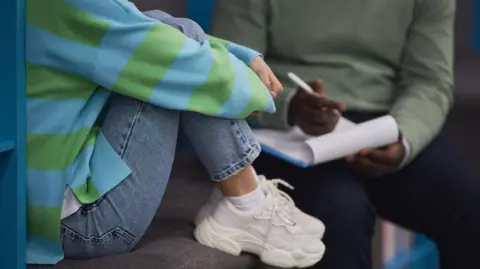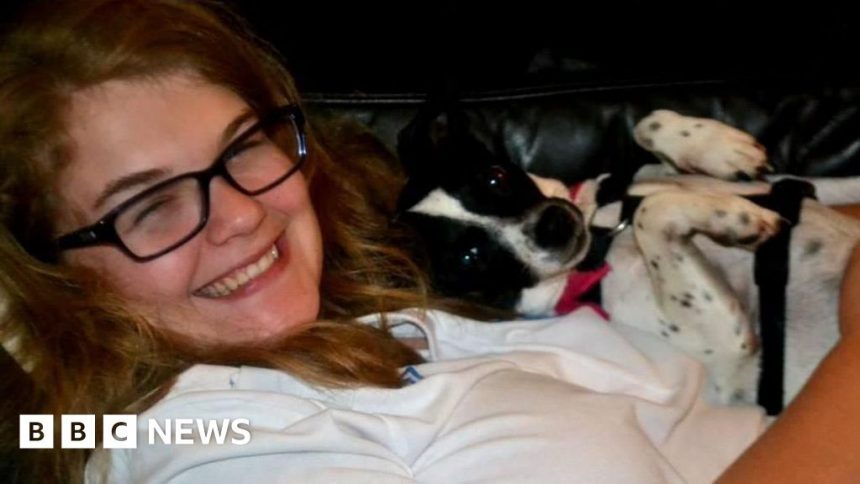‘This wasn’t our crime’: Parental imprisonment and those left behind
 Kerry Wright
Kerry WrightAt the age of 17, Kerry Wright’s parents were arrested while she was living with them in Spain.
They were subsequently extradited and jailed meaning that Ms Wright had to drop out of school in Spain and move back to the UK.
She told BBC Radio 4’s Woman’s Hour this week that she was told she couldn’t access the care system because of her age and was denied help from the housing authorities. She ended up sofa-surfing with £100 to her name.
“People just assume with kids or young people that when their parents are… arrested and put in prison that they’ve got family to go to,” she said. “That didn’t work out for me.”
Now in her late twenties, Ms Wright spoke to Woman’s Hour’s about her experience as part of this week’s Forgotten Children series looking at the impact on children when a parent goes to prison.
She said the British arresting officers at the time “pretty much” ignored her and she remembered one of the officers commenting: “Now this is done, we can go for a glass of wine, can’t we?”
“It felt so surreal that I just stood there and listened to that while watching my parents be carted off,” Ms Wright said.
She has opted not to disclose the nature of parents’ crimes, but outlined the “social stigma” she experienced as a result of their imprisonment.
She described friends “dropping off” following media reports of the offending.
“I felt like I couldn’t talk about it openly without being judged,” she said.
 Getty Images
Getty ImagesAccording to figures released in July, the Ministry of Justice estimates that there were more than 190,000 children with a parent in prison during the 12 months from 1 October 2021.
The figure has been calculated using an estimate of the number of prisoners with children and the average number of dependent children per family.
It is the first time this data has been collated to produce national figures for the prison population in England and Wales – the statistics are still in development.
A government spokesperson said this data will help understand the scale of the challenge.
“Growing up with a parent in prison can have a devastating impact on a child’s life opportunities,” the spokesperson added.
“We have taken measures to better identify and support these children.”
‘You need to find me a new dad’
For Emily – not her real name – the imprisonment of her then-husband for crimes against her led to a reduction in support from children’s services.
She told Woman’s Hour that it felt like their view was that the “problem” had gone.
Her children struggled to understand what had happened – with one repeatedly telling her “you need to find me a new dad”.
Emily said this week: “I felt that that was my fault.
“They noticed that we were different. They were grieving a loss, but he was still there.”
Her youngest child, in reception class at the time, spoke about her dad’s prison sentence in a school assembly.
It prompted a phone call from the school explaining that she would not be allowed to share in assembly again so as not to “worry other children”, Emily explained.
“This wasn’t our crime,” she told Woman’s Hour.
“Why are we being punished and why are we being pushed out of society because of something that happened to us?”
A need for greater support was also something felt by Nan, again not her real name, who took on responsibility for five grandchildren after her daughter was jailed.
Her daughter’s ex-husband was already serving a prison sentence at the time.
Their four boys and one girl lived with Nan in her two-bedroom house for a period of two years.
“I was in a panic constantly,” Nan said.
“We had social services there, but all they wanted to do, basically, was get parental responsibility for the children.
“That worry was there on top of everything else.”
Nan is calling for more support to be made available.
Children Heard and Seen is one charity looking to help fill that gap.
Founder Sarah Burrows said they have supported more than 1,200 young people in the 10 years since they were established.
In February 2023, the charity identified five children living alone following parental imprisonment. One, aged 15, had been alone for months.
“I remember a 15-year-old girl telling me she was dancing to some music with her friends and someone phoned and said ‘your mum’s gone to prison’ – and she was left on her own to manage it,” Ms Burrows said.
“And another mother, who was not expecting to have a prison sentence, going to court and her child being left at school and not having someone to pick her up.”
Ms Burrows wants local authorities to do more – saying children are “slipping through the net”.
 Getty Images
Getty ImagesCriminal justice consultant and research fellow Lucy Baldwin told Woman’s Hour there should be a “multi-agency response” as it will always be appropriate for one or another service to become involved.
“Some families are very capable in supporting themselves but that doesn’t mean the children won’t need additional emotional, practical, psychological, and educational support.”
When Emily spoke to Woman’s Hour she said she and her family needed more guidance at the point of sentencing – so that her children would have know what prison was so they understood it is “not a horrific, horrible thing”.
“It’s not shameful, it’s not embarrassing, it’s not a stigma,” she said.
“It’s not something that we don’t need to talk about.”
You can listen to all the interviews on Woman’s Hour
Additional reporting by Cachella Smith and Tom McArthur






